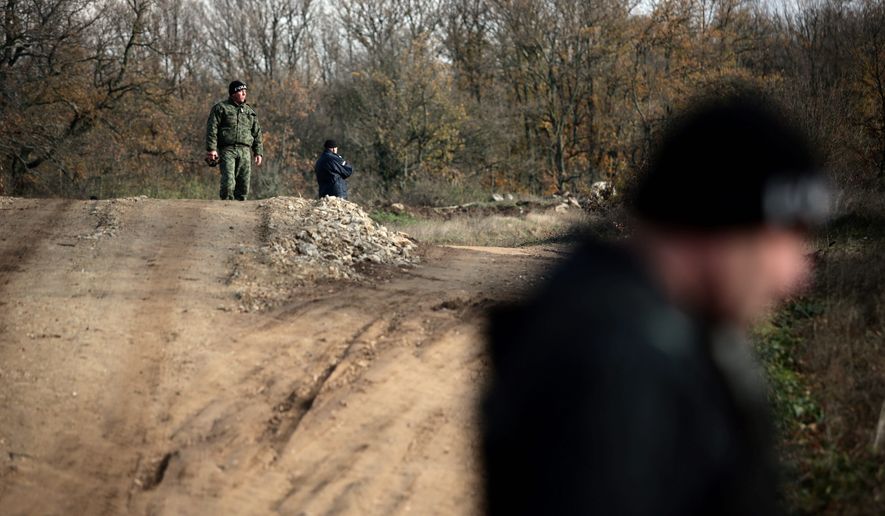SOFIA, Bulgaria — Bulgaria has pulled up its welcome mat in response to an influx of Syrian refugees over the past year.
The poorest and most corrupt member of the European Union, Bulgaria has garnered harsh criticism for its 20-mile-long border fence, suspected mistreatment of refugees trying to cross into the Balkan country from Turkey and the xenophobic climate that awaits those who gain asylum.
Almost 15,000 Syrians have arrived in Bulgaria since last year to escape their country’s civil war, according to the U.N. refugee agency. Sitting on the traditional route between East and West, Bulgaria is a natural entry point for Middle Easterners traveling to Europe.
Although nongovernmental organizations sounded alarm bells about an imminent refugee crisis, Bulgarian officials were unprepared for the flood of Syrians who arrived in the country in the summer of 2013. The first waves of refugees were placed in dilapidated and often filthy military barracks dating from the communist era. It took months for EU aid and volunteers to improve the facilities.
“For us, 10,000 refugees is an enormous challenge,” said Vasil Danov, a spokesman for Bulgaria’s State Agency for Refugees. He said Bulgaria usually receives about 1,000 refugees annually.
As the influx rose to about 100 per day, according to the United Nations, Bulgaria country sent more than 1,000 police officers to the border and erected a fence to stanch the flow, evoking Cold War barriers that came down 25 years ago.
SEE ALSO: Islamic State, al Qaeda agree to join forces in Syria
The flow of refugees has slowed to about 100 a week, according to human rights groups, but Bulgarian authorities have kept their unwelcoming policies. Officials are considering extending the fence by 80 miles, and police are accused of employing violent tactics to keep refugees out of the country.
Last month, Bulgarian police forced 43 Syrian refugees who arrived at the border to turn around, hitting them with batons and dragging them into Turkish territory, according to Human Rights Watch. The group documented similar violence in an April report.
“Beating people who may be seeking asylum and then forcing them back across the border is plain wrong and illegal,” said Lydia Gall, a Balkans and Eastern Europe researcher at Human Rights Watch. “The EU should press Sofia to keep its borders open to Syrians.”
Mr. Danov denied the claims by Human Rights Watch and others. While he admitted that the border has been chaotic at times, the groups’ reports have cited weapons not issued to Bulgarian border police and other inaccuracies, he said.
But Syrians who managed to make it into Bulgaria said they indeed were abused.
“The problem started when we were in detention,” said Elias Sulieman, 31. “One of the police picked on me. If they saw me falling asleep, they would punch or kick me to wake me up.”
Mr. Sulieman has since been given permission to live in Bulgaria, joining about 7,400 others refugees who have found housing or stayed in temporary camps. Educated in Cuba, he speaks Spanish at his job in a call center in Sofia. Like many refugees, he plans to start a better life in Western Europe.
But he barely makes enough money to make ends meet, even though he lives in an apartment and has a girlfriend.
The recent European Parliamentary elections were a wake-up call for Mr. Sulieman.
Bulgaria’s far-right Ataka Party failed to gain any seats in European Parliamentary elections in May, but other anti-immigrant parties like the National Front in France and the United Kingdom’s Independence Party won the largest share of seats from their respective countries, illustrating that such sentiment is on the rise in Europe.
During the Cold War, Bulgarians were exposed to few other ethnicities and its poor economy has never attracted large numbers of foreign tourists, visitors or workers, said Mila Mancheva, a researcher in migration studies at the Sofia-based Center for the Study of Democracy.
“Bulgaria has a lack of experience with foreigners compared to other borders countries like Greece, Italy or Spain,” Ms. Mancheva said. “It is not a country of immigration.”
But she added that the government is guilty of not helping refugees integrate. Bulgaria’s national identity is based on resistance to 500 years of Muslim rule under the Ottoman Empire that ended in the late 19th century. Bulgarian leaders don’t speak out when xenophobes cite that history to demonize the refugees.
“Communities reacted with huge mistrust,” said Ms. Mancheva. “They did not like that the refugees were Muslim. But some of them were Christian.”
• Luigi Serenelli contributed to this report.




Please read our comment policy before commenting.